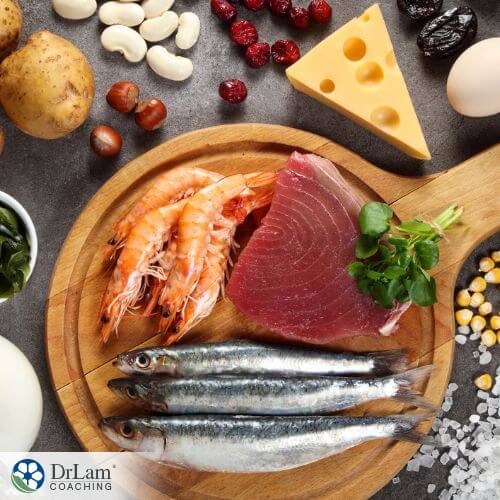 Thyroid health is vital for your body to function. The body requires an adequate amount of thyroid hormone for metabolism and energy use throughout the body. Certain foods for thyroid health can help support this essential organ.
Thyroid health is vital for your body to function. The body requires an adequate amount of thyroid hormone for metabolism and energy use throughout the body. Certain foods for thyroid health can help support this essential organ.
The thyroid is a butterfly-shaped organ located at the front of your neck, under the voice box. The thyroid gland is a vital hormone gland that plays a significant role in the body’s growth, development, and metabolism. It also helps in the regulation of several cellular and physiological bodily functions. It produces three hormones: calcitonin, triiodothyronine, also known as T3, and tetraiodothyronine, also called thyroxine or T4.
Some of the best types of foods for the thyroid contain iodine. This mineral helps minimize the risk of goiter (enlarged thyroid gland) and hypothyroidism. Table salt is a popular source of iodine, but many people are on diets that limit salt intake. However, there are certain food sources that contain iodine.
Note that the recommended daily allowance (RDA) of iodine for adult men and non-pregnant females is 150 micrograms (mcg). For pregnant or lactating women, the recommendation is 220 mcg and 290 mcg, respectively. While slightly higher doses are safe, consistently going over 1100 mcg of iodine could lead to health problems, so it is best to stick close to the RDA when possible.
These are some of the best iodine foods to support your thyroid health.
Seaweed is a valuable source of iodine, but iodine levels vary from one type to the next. A 2021 study in Foods and Nutrition Research, highlighted that an early study in the U.S. that analyzed 12 different species of commercially available seaweeds found that they contained a highly variable iodine content, ranging from 16 μg/g in nori to over 8,000 μg/g in kelp. However, there is generally a greater amount of iodine in brown seaweeds than in the green or red types.
The iodine content in seaweed can be high. As such, while too little iodine is problematic, keep in mind that an excess amount can also be harmful. The key is to get an adequate amount of nutritional benefits from seaweed without over-consumption. Aim for the 150 mcg RDA.
Seaweed varieties include kelp, nori, and wakame. You can add seaweed to your diet in the form of a fresh seaweed salad, add it to soups or smoothies, or add it to a sushi roll. You can also enjoy roasted seaweed. Avoid seaweed supplements and teas.
Cow’s milk is an important source of iodine, with a significant concentration of the mineral. According to one study in the journal Nutrients, the concentration of iodine in milk can be impacted by the iodine content of the cows’ diet and iodine supplementation levels, the presence or absence of goitrogens, sanitation practices, and seasons.
A serving of one cup of low-fat milk will meet roughly one-third of the daily allowance of iodine. Plant-based milk substitutes, like almond milk, only have a small amount of iodine and do not help meet your iodine needs. You can incorporate milk into your diet by adding it to your breakfast cereal or drinking a cup of milk as a beverage.
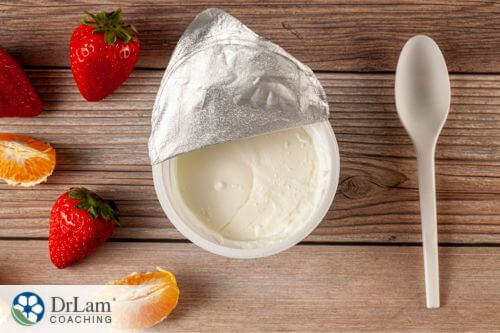 Dairy products, in general, are good iodine foods for your thyroid health, but the amount of iodine available in dairy products varies from one product to the next.
Dairy products, in general, are good iodine foods for your thyroid health, but the amount of iodine available in dairy products varies from one product to the next.
Yogurt is a better source of iodine than milk. Low-fat or non-fat plain yogurt is the best kind, avoiding added sugars. Greek yogurt is denser and has the highest concentration of iodine per ounce. Specifically, a serving of eight ounces of nonfat Greek yogurt has roughly 116 mcg of iodine. This amounts to approximately 75% of the daily allowance.
You can incorporate Greek yogurt into your diet by making it a part of your breakfast, topping it with berries or nuts, adding it to oats, making it a pancake or waffle topping, or adding seasoning and herbs to it to make a delicious dip or salad dressing. You can also treat yourself to a low-fat serving of frozen yogurt.
Iodine is found in seawater making fish and seafood the richest dietary source among foods for thyroid health. Cod is the fish with the highest concentration of iodine. A three-ounce serving of baked cod supplies 158 mcg of iodine. This amount meets the recommended daily minimum for an adult.
You can add fish to your diet in a number of ways, including having it with a salad, in a sandwich, making it the star of taco or pasta night, or adding it to a bowl meal.
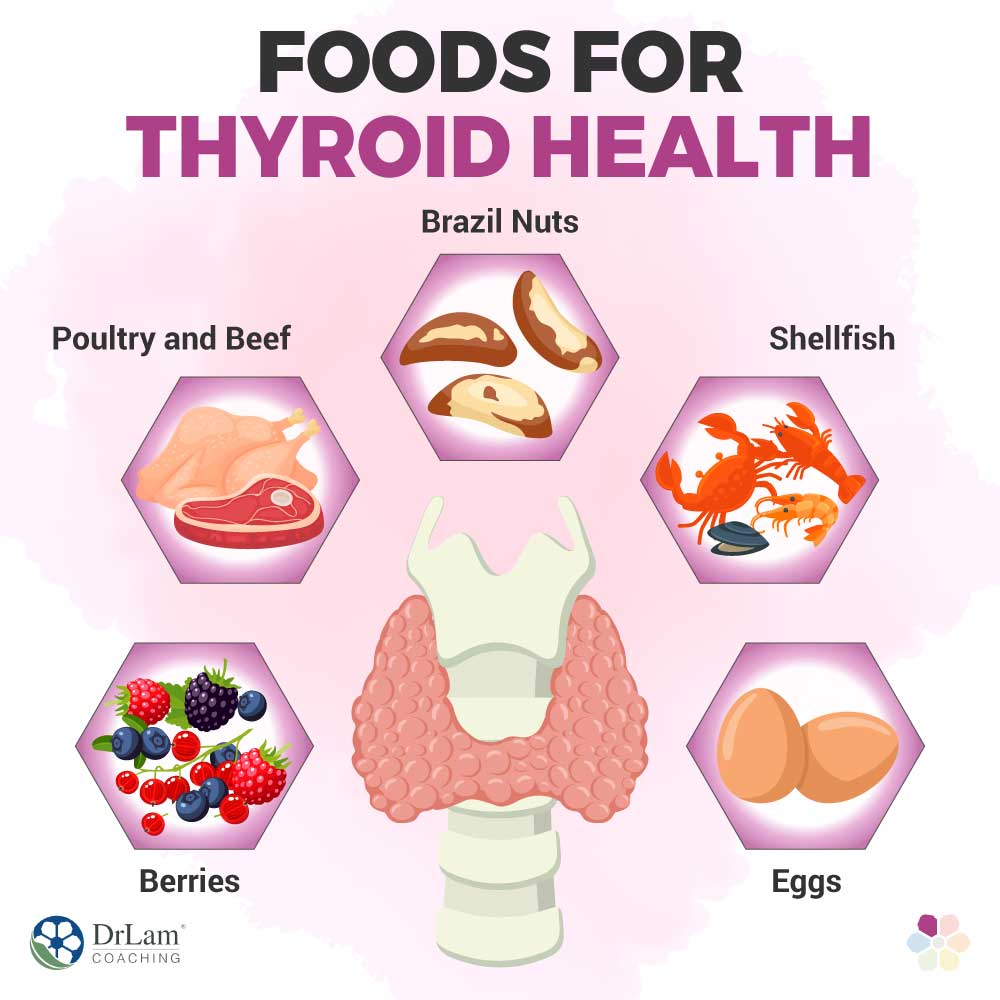
While iodine is essential to support the thyroid, other minerals like selenium and zinc help as well. Antioxidants have also been shown to benefit the thyroid.
While Brazil nuts do not contain iodine, they contain another nutrient called selenium. This helps with the regulation of thyroid hormones. According to the journal Molecules, in the thyroid, selenium is essential for antioxidant function, as well as for the metabolism of thyroid hormones. Selenium can help to minimize the risk of long-term thyroid damage in individuals with thyroid-related health conditions, like Graves’ disease and Hashimoto's.
There is more selenium in Brazil nuts than any other variety of nut. A single Brazil nut contains between 68–91 micrograms (mcg) of selenium, or 175% of the daily value. As such, just one nut daily can provide the necessary amount of nutrients.
When adding Brazil nuts to your diet as one of the foods for your thyroid health, you can incorporate them in a number of ways. These include adding them to oatmeal, adding shavings to meals as a topping, or adding it to pesto sauce.
Another essential nutrient that supports thyroid hormone production is zinc. A deficiency in zinc can result in the development of hypothyroidism. The recommended daily value for zinc is 8 milligrams (mg) for women and 11 mg for adult men.
Chicken and beef are reliable food sources of zinc. Dark meat poultry contains more zinc than white meat, and turkey contains more zinc than chicken. In chicken and turkey, dark meat is sourced from the legs or thighs, which contains roughly 1.5 mg of zinc for every 3 oz.
According to the Journal of the American Dietetic Association, lean beef and beef liver are among the foods highest in zinc, and ground beef is also a good source of zinc. A 3-oz roasted sirloin steak contains roughly 4 mg of zinc, while every 3-oz of cooked ground beef patty provides more than 5 mg of zinc.
These foods for your thyroid health can be part of many dishes, including chicken soup, salad topping, pizza topping, chicken or turkey sandwiches, baked turkey, and stew turkey.
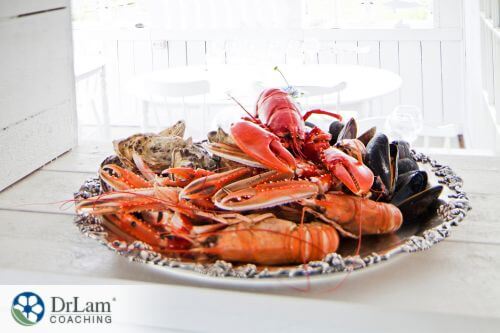 Like cod, shellfish, such as lobster and shrimp are good sources of iodine and zinc. Three ounces of shrimp contains roughly 10% of the recommended intake of iodine. The same weight of Alaskan crab has 6.5 milligrams of zinc, and lobster of the same weight has 3.4 milligrams of zinc. Adding shrimp and lobster to your diet can take different forms, from shrimp tacos, to lobster salads.
Like cod, shellfish, such as lobster and shrimp are good sources of iodine and zinc. Three ounces of shrimp contains roughly 10% of the recommended intake of iodine. The same weight of Alaskan crab has 6.5 milligrams of zinc, and lobster of the same weight has 3.4 milligrams of zinc. Adding shrimp and lobster to your diet can take different forms, from shrimp tacos, to lobster salads.
Foods for thyroid health also include chicken eggs. A single large egg has roughly 26 mcg of iodine or 16% of daily iodine, as well as 20% of the daily selenium your body needs. However, most of the benefits of these minerals are found in the yolk.
Eggs can be eaten as a part of your breakfast, as a salad or noodle topping, used to make soup, or served as a sandwich component.
Good thyroid health also requires foods rich in antioxidants, which are compounds that help reduce oxidative stress. Recent studies have shown that antioxidants are beneficial in the management of thyroid dysfunction. Berries on the whole generally contain high levels of antioxidants, but blue berries and black raspberries are especially high in antioxidants.
A ½ cup is the recommended serving size of most berries. Berries make a healthy snack, can be added to breakfast cereal or oats, added to a smoothie or shake, used as a salad ingredient, or even used to make a pancake sauce.
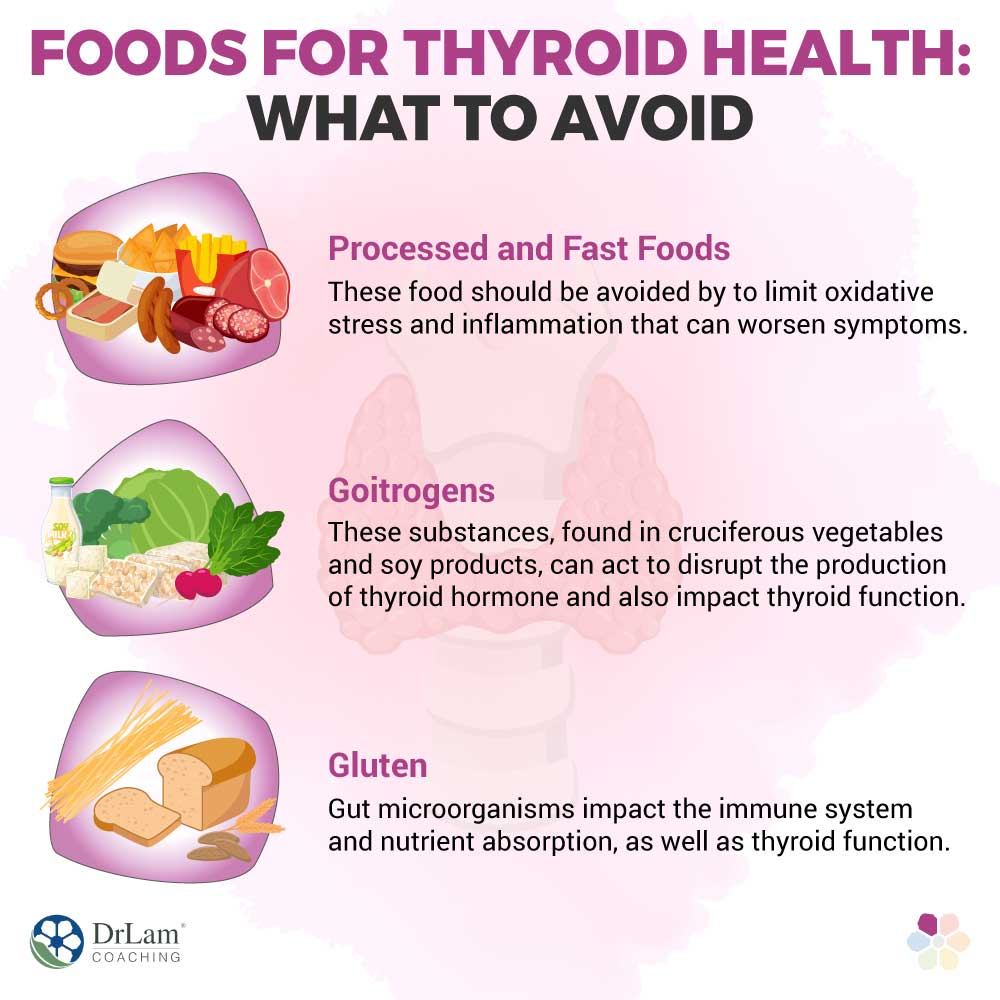
Processed foods cause weight gain, contain toxins, and come with a lot of added salt. However, manufacturers rarely add iodized salt to their products, and the result is often foods high in sodium but lacking the iodine. As a consumer, you have no way of knowing if fast food chains used iodized salt in the meals they serve up.
Other foods may also be lower in iodine, along with other key minerals. In one analysis by the United States Department of Agriculture (USDA) in which the iodine content of popular foods were assessed, it was revealed that, on one hand, a fast food hamburger patty had roughly 3.3 micrograms (mcg) of iodine per 100 g. On the other hand, a non fast-food ground beef patty had 8 micrograms (mcg) of iodine per 100 g.
This could cause hypertension and worsen thyroid health challenges. These food should be avoided by anyone with hypothyroidism to limit oxidative stress and inflammation that can worsen symptoms.
These substances, found in foods, can act to disrupt the production of thyroid hormone and also impact thyroid function. Goitrogens are found in cruciferous vegetables and soy products. However, steaming or blanching these foods seems to help break down some of the enzymes responsible for the goitrogen effect, making them safer for your thyroid health.
If you are someone who suffers from celiac disease, gluten intolerance, or autoimmune thyroid diseases you should strictly avoid gluten. According to a recent study in Nutrients, celiac disease and autoimmune thyroid diseases, like Hashimoto's thyroiditis and Graves' disease, often co-occur.
It appears that there is a significant thyroid-gut connection, indicating that gut microorganisms impact the immune system and nutrient absorption, as well as thyroid function. If you have any of these conditions, stick to a gluten-free diet.
 There are many supplements for thyroid health on the market. But while some of these thyroid products are harmless, others may result in negative side effects or, worse, lead to thyroid dysfunction or damage. And not every medication is the best choice for every individual. Selenium, zinc, iodine, and iron are the main nutrients that support thyroid health. Generally speaking, individuals who adhere to a well-balanced, nutrient-dense diet don’t usually need thyroid-specific supplements. Keep in mind that many thyroid supplements contain elevated levels of iodine and may even contain thyroid hormones.
There are many supplements for thyroid health on the market. But while some of these thyroid products are harmless, others may result in negative side effects or, worse, lead to thyroid dysfunction or damage. And not every medication is the best choice for every individual. Selenium, zinc, iodine, and iron are the main nutrients that support thyroid health. Generally speaking, individuals who adhere to a well-balanced, nutrient-dense diet don’t usually need thyroid-specific supplements. Keep in mind that many thyroid supplements contain elevated levels of iodine and may even contain thyroid hormones.
Natural thyroid supplements that you may find on the market include:
Dr. Lam's Thyro-blast contains a good blend of these nutrients if you want a gentle way of boosting thyroid function without getting into glandulars or medications. Before starting it however it's always important to ask your doctor to determine the best thyroid supplement for your specific needs.
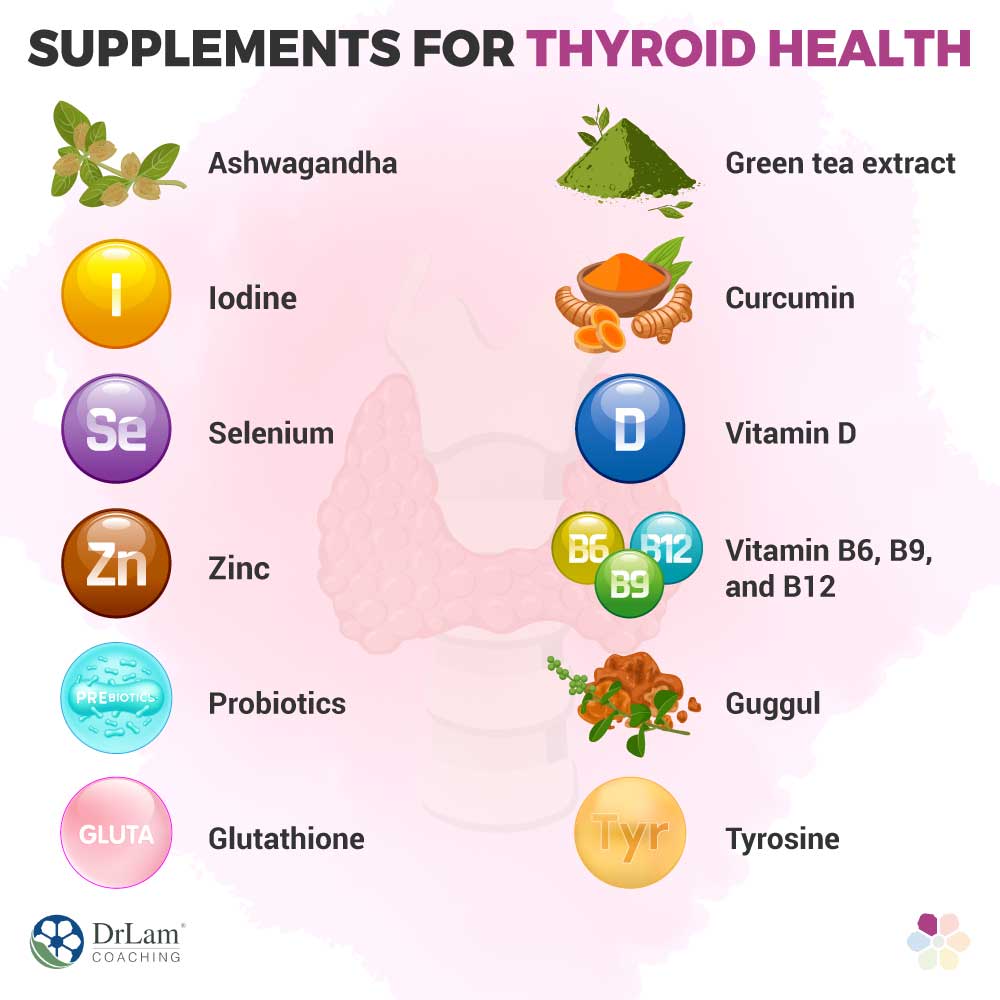
Your hormones regulate several functions in the body. There are three vital organs in the Hormone Circuit of the NeuroEndoMetabolic (NEM) Stress Response model. They are the adrenal glands, thyroid gland, and reproductive organs. They are involved in bodily processes that include, but are not limited to, metabolism, energy production, and reproduction. The thyroid gland, specifically, produces hormones that regulate the body's metabolic rate, growth and development.
Adrenal fatigue and and low thyroid have similar symptoms, like fatigue, brain fog, and weight gain. In some cases, a thyroid issue could be related to adrenal fatigue syndrome (AFS) and caused by chronic stress. In fact, one of the symptoms of AFS is low thyroid function, often despite thyroid medications. It may be necessary for you to determine if the symptoms that you are experiencing are related directly to a thyroid issue or AFS. If you are dealing with these symptoms, you should see a doctor aware of AFS for a thorough medical work up.
Some foods for thyroid health can help supply your thyroid with the essential nutrients it needs to function. But other foods can impede thyroid function or lead to health issues. If you suffer from an underlying thyroid condition and are experiencing worsening symptoms, speak to your doctor. Get a proper assessment at your healthcare provider’s office.
If you are concerned about your thyroid health issues and would like assistance in determining natural ways to remedy them, the team at Dr. Lam Coaching can help. We offer a free** no-obligation phone consultation at +1 (626) 571-1234 where we will privately discuss your symptoms and various options. You can also send us a question through our Ask The Doctor system by clicking here.
Aakre, Inger, et al. “Commercially Available Kelp and Seaweed Products - Valuable Iodine Source or Risk of Excess Intake?” Food & Nutrition Research, vol. 65, 2021, doi:10.29219/fnr.v65.7584.
Gorini, Francesca, et al. “Selenium: An Element of Life Essential for Thyroid Function.” Molecules (Basel, Switzerland), vol. 26, no. 23, 2021, p. 7084, doi:10.3390/molecules26237084.
“How Does the Thyroid Gland Work?” InformedHealth.org, Institute for Quality and Efficiency in Health Care (IQWiG), 17 Nov. 2010, updated 19 Apr. 2018, www.ncbi.nlm.nih.gov/books/NBK279388/.
Murphy, E. W., B. W. Willis, and B. K. Watt. “Provisional Tables on the Zinc Content of Foods.” Journal of the American Dietetic Association, vol. 66, no. 4, 1975, pp. 345–355.
Roseland, Janet M., et al. “Large Variability of Iodine Content in Retail Cow’s Milk in the U.S.” Nutrients, vol. 12, no. 5, 2020, doi:10.3390/nu12051246.
There are several types of food that support thyroid health. These include seaweed, milk, fish and seafood, yogurt, poultry and beef, Brazil nuts, and eggs. Avoid foods that contain goitrogens as well as processed foods and fast foods for a healthy thyroid.